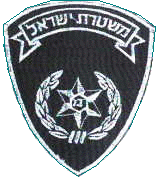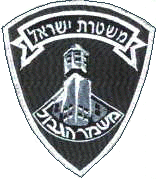






The INP's national headquarters is located in Jerusalem.
Six Departments constitute the INP's national headquarters:
![]() Investigations
Investigations
![]() Operations and Patrol
Operations and Patrol
![]() Logistics,Planning and
Organization
Logistics,Planning and
Organization
![]() Personnel
Personnel
![]() The Border Guard
The Border Guard
![]() The Civil Guard
The Civil Guard
Other units attached to the national headquarters are:
![]() Office of the Legal
Counsel
Office of the Legal
Counsel
![]() Office of the
Spokesperson
Office of the
Spokesperson
![]() Accounting
Accounting
![]() Office of the Internal
Auditor and Ombudsperson
Office of the Internal
Auditor and Ombudsperson
![]() Internal Disciplinary
Court
Internal Disciplinary
Court
![]() Internal Appeals Court
Internal Appeals Court
Israel National Police headquarters houses a centralized computer in which all the country's criminal records are stored. These are integrated with country-wide data banks such as names, addresses and identification numbers of all adults in Israel, registration of all weapons and their ownership, vehicle registration and driving licenses, etc.
Divided into five areas geographically, the INP is divided into 5 District Commands:
![]() Jerusalem
Jerusalem
![]() Northern
Northern
![]() Central
Central
![]() Southern
Southern
![]() Tel Aviv - MY ONE
Tel Aviv - MY ONE
The District Commanders are directly responsible to the Police Commissioner. These Districts are divided into 13 Sub-Districts, each of which is under the direction of a Police Commander.
The Sub-Districts are divided into Police Stations and Police Precincts. Each of the Districts and Subdistricts is managed by an administrative and operational headquarters that parallels the organization of the central INP headquarters in Jerusalem. In other words, police functions such as investigations, operations, patrol, personnel management, and deployment of the Civil Guard, are carried out at various levels: national, district, subdistrict, and station. The Border Guard, however, is organized in a different manner and has separate bases and its own unique line of command.
Police Units in Judea, Samaria and Gaza
The "Administered Territories", are organized into three Sub-districts and 12 Stations: Judea and Gaza under the command of the Southern District, and Samaria under command of the Northern District. The legal basis for police work in these areas is the body of Israel Defence Force (IDF) regulations formulated in accordance with the Geneva Convention. Three legal systems are operative in Judea, Samaria and Gaza:
![]() Local law - Jordanian
law applies in Judea and Samaria, and Egyptian law in Gaza.
Local law - Jordanian
law applies in Judea and Samaria, and Egyptian law in Gaza.
![]() Israeli civil law -
for all Israelis residing in or visiting Judea, Samaria and Gaza.
Israeli civil law -
for all Israelis residing in or visiting Judea, Samaria and Gaza.
![]() Israeli military law -
applicable to all persons in these areas.
Israeli military law -
applicable to all persons in these areas.
There are approximately 2,500 investigators nation wide, who handle about 300,000 cases each year. The investigative work is backed up by state-of-the-art forensic science and criminal identification units and various specialist departments:
The Criminal Identification Division is the scientific arm of the police in its fight against crime. The Division analyzes evidence with an entry range of modern tests (fingerprints, drugs, explosives and flammable materials, ballistics, etc.) in its specialized laboratories at Israel National Police headquarters in Jerusalem. Each regional subdivision has technicians who are sent to gather evidence from crime scenes. The evidence is sent to the INP's centralized laboratories for further examination and for presentation by forensic experts as evidence in court. In addition, special testing and evidence-gathering kits have been developed to make the task of these technicians easier.
The Intelligence Division coordinates and directs the intelligence and detective work undertaken throughout the country at all levels. Efforts are concentrated upon serious "target criminals" in accordance with an evaluation that is made at the various strata of the police hierarchy. All intelligence data is centrally computerized and can easily be retrieved. In addition to the above functions, the division is responsible for all drug-related enforcement work, as well as for international cooperation with foreign police forces. Since 1949, Israel has been a member of INTERPOL, and extensive operational cooperation takes place on a regular basis via this organization. Several police representatives are stationed abroad (USA, Germany, France, and the Netherlands) in order to facilitate international investigations. National Investigation Units: There are two national investigation units: one for serious crimes such as drug trafficking, fraudulent land sales, the operation of car theft rings, and the second for dealing with white-collar crime.
This department is responsible for all the daily operational activities of the INP: Patrol (motorized, horse, marine, airborne), traffic enforcement, maintenance of civil order, deployment of animals, crime prevention, anti-terrorist activities, and the licensing of business establishments (largely for crime prevention purposes).
National Operation Units: Three nationally based units are under the direct supervision of this Department: The Helicopter Unit, National Traffic Unit, which is responsible for traffic enforcement on the highways, and National Negotiations Team, used when hostage situations arise.
Established in 1975, the Bomb Disposal Division operates in the realm of both criminal and terrorist sabotage activities. The Division's teams handle about 80,000 calls per year to check suspicious objects and cars. Less than 1% of these class actually involve incendiary or explosive devices. An important aspect of the Bomb Disposal Unit's work is its prevention program, which includes surveillance of crowded public areas and facilities, and educational programs in the schools.
In the wake of a series of terrorist incidents in early 1974 and public pressure, the Israeli Cabinet formed the Civil Guard, which is a volunteer force for the maintenance of security on the homefront within the framework of the Israel National Police.
In order to prevent terrorist activity in residential areas, the Civil Guard maintains a network of neighborhood command centers that operates ununiformd armed mobile and foot patrols, runs training programs, and organizes rapid response teams for emergency duty.
Today Civil Guard volunteers, aged 17 to 80, who number about 45,000 are The Civil Guard includes special unitormd units that provide volunteer aid to regular police units in a range of activities: traffic control and enforcement of traffic regulations, crime prevention, patrol functions, etc. While on duty, Civil Guard volunteers have total police authority, they must volunteer for at least four hours per month, and are usually armed. They must undergo regular target practice and other police training courses.
The Border Guard, which is a special military unit in the Israel National Police, maintain internal security and public order and provides assistance, when necessary, to regular operational police units in the fight against crime. Deployed throughout Israel, as well as in Judea, Samaria and Gaza, the Border Guard is unique in terms of its composition, with its officers including representatives of all Israel's ethnic groups: Jews, Druze, Circassians, Beduins, Christians, and Moslems. New 18-year-old recruits can do their mandatory military duty with the Border Guard instead of with the IDF (Israel Defence Forces).
The INP's anti-terrorist combat unit, which organizationally belongs to the Border Guard, deals with terrorist activities within the borders of the country, operates in hostage-taking situations, and serious public disturbances.
IF YOU HAVE A QUESTION
PLEASE DROP ME A LINE

This page hosted by ![]() Get your own Free Home Page
Get your own Free Home Page